
Main Conference Day 1: Thursday 26th September
08.00 – 09.00: Registration and Morning Welcome Coffee
09.00 – 09.15: Legends in Quantitative Finance: Riccardo Rebonato
Introduction: Andrei Lyashenko

Riccardo Rebonato:
Professor – Climate Impact Institute Scientific and Programme Director, EDHEC Business School
Riccardo Rebonato: Professor – Climate Impact Institute Scientific Director and Programme Director, EDHEC Business School
Riccardo Rebonato is Scientific Director of EDHEC-Risk Climate Impact Institute and Professor of Finance at EDHEC Business School. He heads EDHEC-Risk Climate Impact Institute’s “Impact of Climate Change on Asset Prices” research programme.
He holds doctorates in Nuclear Engineering and Condensed Matter Physics. Riccardo has been Head of Derivatives Trading, Risk Management and Research for leading international financial institutions on the sell- and buy-side, and served on the boards of ISDA and GARP. He was previously a Professorial Visiting Fellow at Edinburgh University (Political Economics and Sociology), Visiting Lecturer at Oxford University (Mathematical Finance), Adjunct Professor at Imperial College, London (Financial Economics) and a Research Fellow in Physics at Corpus Christi College, Oxford. Riccardo is currently Series Editor for the Cambridge Elements in Quantitative Finance.
He has published an extensive body of academic work, including more than 10 books and approximately 50 articles in refereed journals, in the areas of derivatives pricing, risk management, asset pricing and, latterly, the economics of climate change. His latest book deals with using economics to tackle climate change.
The Journal of Portfolio Management named him 2022’s “PMR Quant Researcher of the Year”.
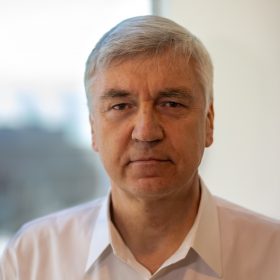
Andrei Lyashenko:
Head of Market Risk and Pricing Models, Quantitative Risk Management (QRM), Inc.
Andrei Lyashenko: Head of Market Risk and Pricing Models, Quantitative Risk Management (QRM), Inc.
Andrei Lyashenko is the head of Market Risk and Pricing Models at the Quantitative Risk Management (QRM), Inc. in Chicago. His team is responsible for research, implementation and support of pricing and risk models across multiple asset classes. In November 2019, he was awarded the prestigious Quant of the Year award, jointly with Fabio Mercurio from Bloomberg, L.P., for their Risk Magazine paper on modeling backward-looking rates.
Andrei is also adjunct professor at the Illinois Institute of Technology. Before joining the QRM in 1997, Andrei was on the mathematical faculty at the University of Illinois at Chicago and Iowa State University. Prior to coming to the US, he conducted academic research in applied math in Russia, Japan and Italy and published numerous research papers in the area of fluid stability in major mathematical journals. He holds a BSc in Mathematics from the Novosibirsk State University, Russia and a PhD in Mathematics from the Russian Academy of Science.
Morning Stream Chair: TBC
09.15 – 10.00: Notation as a tool of thought? LLMs, cognitive biases, and logical fallacies.
In 1979, Kenneth E. Iverson, the inventor of APL (which became the progenitor of an entire family of programming languages, such as A+, k, and q) delivered his ACM Turing Award Lecture. He emphasised the “importance of nomenclature, notation, and language as tools of thought.” Iverson, along with other computer scientists, such as Bjarne Stroustrup and Guido van Rossum continued to work on programming languages – specialized notations that eschewed the limitations of natural (human) languages, thus facilitating complex and precise computation – and advancing science. In recent years, there has been a reversal in computer science: natural language became the tool of choice; the widely adopted large language models (LLMs) use natural language as input and output and work on natural language-based intermediate representations. Nonetheless, there is a certain unease about natural languages, which is probably a legacy of “Newspeak” described in George Orwell’s “Ninety-Eighty Four.” Not only can natural languages be used as a tool of manipulation (as in Orwell’s dystopian novel); they are inherently vulnerable to cognitive biases and logical fallacies, which may be an unavoidable feature of human existence. In this talk we explore the implications of this vulnerability. We also examine the significant role that cognitive biases and logical fallacies play in finance and economics. We compare and contrast LLMs and other directions in AI, such as reinforcement learning, where the emphasis is on provable optimality, which is missing in LLMs. Finally, we discuss various approaches to fixing this vulnerability.

Paul Bilokon:
CEO, Thalesians, Visiting Professor, Imperial College
Paul Bilokon: CEO, Thalesians, Visiting Professor, Imperial College
Dr. Paul Bilokon is CEO and Founder of Thalesians Ltd and an expert in electronic and algorithmic trading across multiple asset classes, having helped build such businesses at Deutsche Bank and Citigroup. Before focussing on electronic trading, Paul worked on derivatives and has served in quantitative roles at Nomura, Lehman Brothers, and Morgan Stanley. Paul has been educated at Christ Church College, Oxford, and Imperial College. Apart from mathematical and computational finance, his academic interests include machine learning and mathematical logic.
10.00 – 10.45: Generative AI for Data Analysis

Ioana Boier:
Ioana Boier: Senior Principal Solutions Architect, NVIDIA
I have a Ph.D. in Computer Science from Purdue University. In addition, I have completed graduate coursework in Financial Mathematics at NYU and Big Data at Harvard University. Prior to joining Citadel, I was a Director in the Global Markets Division at BNP Paribas where I managed the Interest Rate Options & Inflation quantitative research team. Before transitioning into Finance, I was a research staff member at the IBM T. J. Watson Research Center.
10.45 – 11.15: Morning Break and Networking Opportunities
11.15 – 12.00: Evaluating LLMs in Financial Tasks – Code Generation in Trading Strategies
In this paper, we perform a comprehensive evaluation of various Large Language Models (LLMs) for their efficacy in generating Python code specific to algorithmic trading strategies. Our study encompasses a broad spectrum of LLMs, including GPT-4-Turbo, Gemini-Pro, Mistral, Llama2, and Codellama, assessing their performance across a series of task-specific prompts designed to elicit precise code implementations for over various technical indicators commonly used in the financial trading sector.
A principal component of our methodology involves the creation of a detailed prompt structure that adapts to the unique capabilities of each LLM. For OpenAI’s Assistant AI, we leverage an intricate prompt design that integrates templated responses, zero-shot task- specific prompts, and prompt chaining to guide the models through a step-by-step reasoning process, ensuring the generation of executable and accurate Python code. This structured approach not only facilitates the model’s comprehension of the task at hand but also allows for the nuanced adaptation of prompts to cater to the distinct processing styles of different LLMs.
Our evaluation framework is grounded in a comparison against baseline results obtained from widely recognized libraries such as TALib, as well as a comprehensive Python implementation of the indicators. Through a meticulous process of parsing our code and constructing data frames that encapsulate function names, parameters, and documentation, we establish a foundational prompt that prompts LLMs to propose viable Python code implementations. This zero-shot task-specific approach is crucial in enabling the LLMs to methodically navigate through the tasks, thereby enhancing the accuracy and relevance of the generated code. The findings indicate that GPT-4-Turbo, Codellama-70B, and Gemini-Pro yield encouraging results relative to baseline computations, with GPT-4-Turbo achieving identical implementations to the baseline in certain instances.
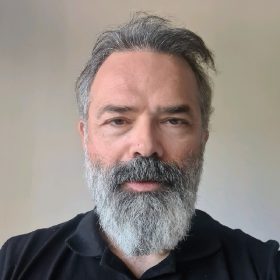
Miquel Noguer Alonso:
Co – Founder and Chief Science Officer, Artificial Intelligence Finance Institute – AIFI
Miquel Noguer Alonso: Co – Founder and Chief Science Officer, Artificial Intelligence Finance Institute – AIFI
Miquel Noguer is a financial markets practitioner with more than 20 years of experience in asset management, he is currently Head of Development at Global AI ( Big Data Artificial Intelligence in Finance company ) and Head on Innovation and Technology at IEF.
He worked for UBS AG (Switzerland) as Executive Director.for the last 10 years. He worked as a Chief Investment Office and CIO for Andbank from 2000 to 2006.
He is professor of Big Data in Finace at ESADE and Adjunct Professor at Columbia University teaching Asset Allocation, Big Data in Finance and Fintech. He received an MBA and a Degree in business administration and economics in ESADE in 1993. In 2010 he earned a PhD in quantitative finance with a Summa Cum Laude distinction (UNED – Madrid Spain).
12.00 – 12.45: Integrating Large Language Models for Enhanced ESG and Climate Risk Analysis in Finance
In this session, we’re diving into how Large Language Models (LLMs) can be used in ESG and climate risk analysis for finance. We’ll break down how these AI tools help us sift through huge amounts of data to spot risk patterns and insights that might not be obvious at first glance. We’ll see firsthand the value of LLMs in understanding and managing the risks tied to ESG. Will look into how to leverage these technologies for a more informed decision-making approach in finance.

David Pacheco Aznar:
Founding Partner & Chief of AI Research and Development, Raven Risk AI
David Pacheco Aznar: Founding Partner & Chief of AI Research and Development, Raven Risk AI
12.45 – 14.00: Lunch
Afternoon Stream Chair: TBC
14.00 – 14.45: What-If Trade Entry from Email using LLMs
- Manually entering complex trades for what-if analysis is a slow and unreliable component of what is otherwise a highly effective process of trade execution
- We discuss the key techniques involved in building LLM-based trade entry from natural language trade description contained in unstructured email messages or threads
- We present specialized prompting and RAG techniques for dealing with complex trade definition formats and logic
- GPT-4o, LLAMA 2/3 and Mixtral models are compared on examples from all major asset classes
- Open-source code for all examples and tests will be provided

Alexander Sokol:
Executive Chairman and Head of Quant Research, CompatibL
Alexander Sokol: Executive Chairman and Head of Quant Research, CompatibL
Alexander Sokol is the founder, Executive Chairman, and Head of Quant Research at CompatibL, a trading and risk technology company. He is also the co-founder of Numerix, where he served as CTO from 1996 to 2003, and the co-founder of Duality Group, where he served as CTO from 2017 to 2020.
Alexander won the Quant of the Year Award in 2018 together with Leif Andersen and Michael Pykhtin, for their joint work revealing the true scale of the settlement gap risk that remains even in the presence of initial margin. Alexander’s other notable research contributions include systemic wrong-way risk (with Michael Pykhtin, Risk Magazine), joint measure models, and the local price of risk (with John Hull and Alan White, Risk Magazine), and mean reversion skew (Risk Books, 2014).
Alexander earned his BA from the Moscow Institute of Physics and Technology at the age of 18, and a PhD from the L. D. Landau Institute for Theoretical Physics at the age of 22. He was the winner of the USSR Academy of Sciences Medal for Best Student Research of the Year in 1988.
14.45 – 15.30: How to apply LLM Agents in Finance?

Hanane Dupouy:
Director – Algorithmic Trader, Societe Generale Corporate and Investment Banking
Hanane Dupouy: Director – Algorithmic Trader, Societe Generale Corporate and Investment Banking
15.30 – 16.00: Afternoon Break and Networking Opportunities
16.00 – 16.45: LLM Adaptation to Financial Tasks
- We investigate how foundational LLMs can be adapted to specific financial tasks and what are the issues and challenges
- We use Parameter-Efficient Finetuning (PEFT) such as LoRA and QLoRA and extensive textual datasets from LSEG/Refinitiv to finetune LlaMa 3
- We consider two main business cases: analysis of analysts’ call transcripts and aggregate analysis of financial news.
- We compare the performance of finetuned and foundational LLMs in both contexts and provide answers to some of the challenges such as data pipeline, compute time and quality of the resulting finetuned LLMs

Svetlana Borovkova:
Head of Quantitative Modelling, Probability & Partners. Associate Prof, Vrije Universiteit Amsterdam
Svetlana Borovkova: Head of Quantitative Modelling, Probability & Partners and Associate Professor, Vrije Universiteit Amsterdam
Dr Svetlana Borovkova is the partner and Head of Quant Modelling of risk management consulting firm Probability and Partners and an Associate Professor of Quantitative Finance and Risk Management at the Vrije Universiteit Amsterdam. She is the author of over 60 academic and professional publications and a frequent speaker at conferences such as RiskMinds and QuantMinds. Her work encompasses a wide range of topics, ranging from derivatives pricing and risk modelling to sentiment analysis for quant investing and machine learning in quant finance. Find her work at SSRN and her columns on various finance topics in Financial Investigator.
16.45 – 17.30: Pathwise Methods and Generative Models for Pricing and Trading
The deep hedging framework as well as related deep trading setups have opened new horizons for solving hedging problems under a large variety of models and market conditions. In this setting, generative models and pathwise methods rooted in rough paths have proven to be a powerful tool from several perspectives. At the same time, any model – a traditional stochastic model or a market generator – is at best an approximation of market reality, prone to model-misspecification and estimation errors. In a data-driven setting, especially if sample sizes are limited by constraints, the latter issue becomes even more prevalent, which we demonstrate in examples. This raises the question, how to furnish a modelling setup (for deriving a strategy) with tools that can address the risk of the discrepancy between model and market reality, ideally in a way that is automatically built in the setting. A combination of classical and new tools yields insights into this matter.
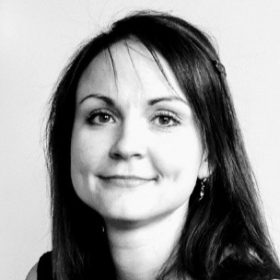
Blanka Horvath:
Associate Professor in Mathematical and Computational Finance, University of Oxford
Blanka Horvath: Associate Professor in Mathematical and Computational Finance, University of Oxford and Researcher, The Alan Turing Institute
Blanka research interests are in the area of Stochastic Analysis and Mathematical Finance.
Including asymptotic and numerical methods for option pricing, smile asymptotics for local- and stochastic volatility models (the SABR model and fractional volatility models in particular), Laplace methods on Wiener space and heat kernel expansions.
Blanka completed her PhD in Financial Mathematics at ETHZürich with Josef Teichmann and Johannes Muhle-Karbe. She holds a Diploma in Mathematics from the University of Bonn and an MSc in Economics from the University of Hong Kong.
17.30 – 18.15: QFC Panel
Large Language Models (LLM) in Quant Finance – A Gimmick or a Game Changer?
- Will LLLMs help us read derivatives term sheets, UCITS documentation, and securitization rules
- Will LLLMs help us document our models for the regulators
- Will LLLMs help us find bugs in our pricing models
- GPT-4 or LLAMA 2?
ML Models for Valuation, XVA, and Risk
- How to build trustworthy ML quant models that auditors and regulators will approve
- Due to the lack of sufficient training data, is ML in quant models truly learning or only providing a better way to interpolate
Gala Dinner: TBC
08.00 – 09.00: Registration and Morning Welcome Coffee
09.00 – 09.15: Legends in Quantitative Finance: Riccardo Rebonato
Introduction: Andrei Lyashenko

Riccardo Rebonato:
Professor – Climate Impact Institute Scientific and Programme Director, EDHEC Business School
Riccardo Rebonato: Professor – Climate Impact Institute Scientific Director and Programme Director, EDHEC Business School
Riccardo Rebonato is Scientific Director of EDHEC-Risk Climate Impact Institute and Professor of Finance at EDHEC Business School. He heads EDHEC-Risk Climate Impact Institute’s “Impact of Climate Change on Asset Prices” research programme.
He holds doctorates in Nuclear Engineering and Condensed Matter Physics. Riccardo has been Head of Derivatives Trading, Risk Management and Research for leading international financial institutions on the sell- and buy-side, and served on the boards of ISDA and GARP. He was previously a Professorial Visiting Fellow at Edinburgh University (Political Economics and Sociology), Visiting Lecturer at Oxford University (Mathematical Finance), Adjunct Professor at Imperial College, London (Financial Economics) and a Research Fellow in Physics at Corpus Christi College, Oxford. Riccardo is currently Series Editor for the Cambridge Elements in Quantitative Finance.
He has published an extensive body of academic work, including more than 10 books and approximately 50 articles in refereed journals, in the areas of derivatives pricing, risk management, asset pricing and, latterly, the economics of climate change. His latest book deals with using economics to tackle climate change.
The Journal of Portfolio Management named him 2022’s “PMR Quant Researcher of the Year”.

Andrei Lyashenko:
Head of Market Risk and Pricing Models, Quantitative Risk Management (QRM), Inc.
Andrei Lyashenko: Head of Market Risk and Pricing Models, Quantitative Risk Management (QRM), Inc.
Andrei Lyashenko is the head of Market Risk and Pricing Models at the Quantitative Risk Management (QRM), Inc. in Chicago. His team is responsible for research, implementation and support of pricing and risk models across multiple asset classes. In November 2019, he was awarded the prestigious Quant of the Year award, jointly with Fabio Mercurio from Bloomberg, L.P., for their Risk Magazine paper on modeling backward-looking rates.
Andrei is also adjunct professor at the Illinois Institute of Technology. Before joining the QRM in 1997, Andrei was on the mathematical faculty at the University of Illinois at Chicago and Iowa State University. Prior to coming to the US, he conducted academic research in applied math in Russia, Japan and Italy and published numerous research papers in the area of fluid stability in major mathematical journals. He holds a BSc in Mathematics from the Novosibirsk State University, Russia and a PhD in Mathematics from the Russian Academy of Science.
Morning Stream Chair: TBC
09.15 – 10.00: Volatility Shape-Shifters: arbitrage-free transformations of a volatility surface
- No Arbitrage & Convex order
- Optimal transport
- One-X & Ohlin’s theorem
- Convex Order generating/preserving transformations
- Time extrapolation:
- No market information
- Regeneration with Memory
- Conclusions

Valer Zetocha:
Senior Quantitative Analyst, ED, Julius Baer
Valer Zetocha: Senior Quantitative Analyst, ED, Julius Baer
10.00 – 10.45: From Local Volatility to Local Time
- Revisit of probabilistic techniques for local volatility models
- Generic formulation of the probability density function (pdf)
- Applications:
- Extension of Quadratic Volatility with additional control over higher order moments
- Regime change, Singular Local Volatility and connection to Local Time
- Closed form solutions for option pricing
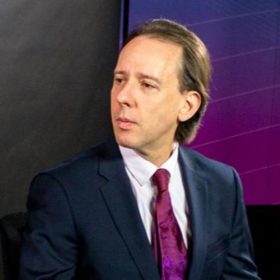
Dominique Bang:
Managing Director, FICC Quantitative Modelling Lead, Bank Of America
Dominique Bang: Managing Director, FICC Quantitative Modelling Lead, Bank Of America Paris
Dominique Bang received his PhD from Observatory of Paris (2002) in the field of ‘Mathematical Methods applied to Celestial Mechanics’. He moved into quantitative finance in 2006. Dominique has since been working in Bank Of America in the interest rates and hybrid quantitative team where he is covering every aspect ranging from plain vanilla to exotic structured products.
10.45 – 11.15: Morning Break and Networking Opportunities
11.15 – 12.00: Next Gen Finite Difference Grids
- Stability and accuracy of fd solution: myths, facts and orthodoxy
- Discrete consistency: backwards, forwards and Dupire fd solution.
- local volatility and absence of arbitrage
- Dividends.
- stochastic volatility
- jumps
- american options
- the spx/vix conundrum again again

Jesper Andreasen:
Head of Quantitative Analytics, Verition Fund Management LLC
Jesper Andreasen: Head of Quantitative Analytics, Verition Fund Management LLC
Jesper Andreasen is head of Quantitative Analytics at Verition Fund Management LLC. Jesper has previously held senior positions in the quantitative research departments of Saxo Bank, Danske Bank, Bank of America, Nordea, and General Re Financial Products. Jesper’s recent research focusses on efficient and accurate methods for computing credit and market risk. Jesper holds a PhD in mathematical finance from Aarhus University, Denmark. He received Risk Magazine’s Quant of the Year awards in 2001 and 2012, joint with Leif Andersen and Brian Huge respectively, and is an honorary professor of mathematical finance at Copenhagen University.
12.00 – 12.45: P vs Q ~ drift vs vol
P vs Q can be described as modelling drift vs modelling volatility. Under Q-measure, drifts are fixed and the bulk of research focuses on modelling volatility and correlation. Under P-measure, the opposite is the case: it is (relatively) easy to estimate historical volatilities and correlations, but specification of the long-term drifts is a problem. One way of dealing with it is to introduce historical regime switch model, removing the necessity to provide a single drift estimate. We consider such a model for an asset-like product modelling.

Andrey Chirikhin:
Head of Structured Credit QA, Barclays Investment Bank
Andrey Chirikhin: Head of Structured Credit QA, Barclays Investment Bank
Andrey was formerly Head of Modelling and Quantitative Analytics for L1 Treasury, part of a USD 25bn privately held investment vehicle LetterOne. Prior to LetterOne, Andrey was MD and Head of CVA and CCR quantitative Analytics at RBS. There he has created and run the front office cross asset CVA quant team. He also restructured and led the risk-side quant team charged with delivering a new Basel III compliant internal CCR methodology. The system utilizing the newly delivered methodology has won the 2013 Internal System of the year Risk award. In his 20 year career in investment banking, Andrey held several leadership and senior quant positions at Goldman Sachs, HSBC and Dresdner Kleinwort. Andrey Chirikhin holds PhD in Theoretical Statistics from Warwick University (UK), MBA from INSDEAD and MSc in Applied Mathematics from Moscow Institute for Physics and Technology (Phystech).
Since 2018 Andrey runs his own company, Quantitative Recipes, that advises on wide rage of XVA, long-term market modelling for risk and quant infrastructure.
12.45 – 14.00: Lunch
Afternoon Stream Chair: TBC
14.00 – 14.45: Transaction costs for cash-settled options, revisited
- Option exercise optimality is in the eye of the (be-)holder
- Spot not the value of the hedge
- Getting in is not for free
- Cash-settled options, à la Leland, but not quite.

Peter Jaeckel:
Independent financial mathematics and analytics consultant. OTC Analytics
Peter Jaeckel: Independent financial mathematics and analytics consultant. OTC Analytics
Peter Jäckel received his DPhil from Oxford University in 1995. In 1997, he moved into quantitative analysis and financial modelling when he joined Nikko Securities. Following that he worked as a quantitative analyst at NatWest, Commerzbank Securities, ABN AMRO, and now VTB Capital where he is the Deputy Head of Quantitative Research. Peter is the author of “Monte Carlo Methods in Finance” published by John Wiley & Sons. Some of his publications can be found at WWW.JAECKEL.ORG.
14.45 – 15.30: Towards the lower bound for Bermudans
- An achievable lower bound for a Bermudan is not always the max European
- Finding a robust (model-free) lower bound for Bermudans is surprisingly difficult
- It is important for designing “Bermudan discount” adjustment models prevalent in the industry for the last 30+ years
- We make some progress towards this goal

Vladimir Piterbarg:
MD, Head of Quantitative Analytics and Quantitative Development, NatWest Markets
Vladimir Piterbarg: MD, Head of Quantitative Analytics and Quantitative Development at NatWest Markets
15.30 – 16.00: Afternoon Break and Networking Opportunities
16.00 – 16.45: The Geometry of Finance
- Parametric models may prevent static arbitrage but their recalibration often produce dynamic arbitrage
- The geometry of hedging: dependency on the target instrument, the hedging instruments and the model
- The geometry of investing: alpha explained by the Numeraire Portfolio and consequences
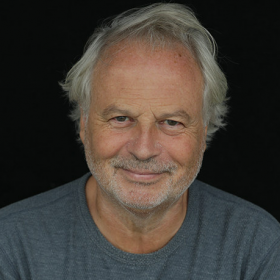
Bruno Dupire:
Head of Quantitative Research, Bloomberg
Bruno Dupire: Head of Quantitative Research, Bloomberg
Bruno Dupire is the Global Head of Quantitative Research, CTO Office at Bloomberg, which he joined in 2004. Prior to this assignment in New York, he has headed the Derivatives Research teams at Société Générale, Paribas Capital Markets and Nikko Financial Products where he was a Managing Director. He is best known for having pioneered the widely used Local Volatility model (simplest extension of the Black-Scholes-Merton model to fit all option prices) in 1993 and the Functional Itô Calculus (framework for path dependency) in 2009. He is a Fellow and Adjunct Professor at NYU and he is in the Risk magazine “Hall of Fame”. He is the recipient of the 2006 “Cutting edge research” award of Wilmott Magazine and of the Risk Magazine “Lifetime Achievement” award for 2008. He runs and organizes the Bloomberg Quant (BBQ) seminar, the largest monthly event of this kind.
16.45 – 17.30: Arbitrage-free P and Q dynamics of Nelson-Siegel factor HJM model with stochastic volatility
- Dynamics of Factor HJM model under P and Q measures
- Risk-premia in Nelson-Siegel HJM model
- Calibration to swaptions and options on rates futures under Q measure
- Forecast and long-term simulation of model dynamics under P and Q measures
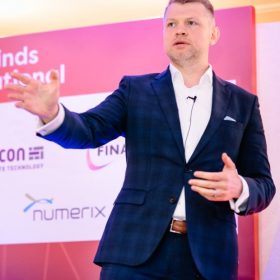
Artur Sepp:
Head Quant, LGT Bank
Artur Sepp: Head Quant, LGT Bank
Artur Sepp is the head quant at LGT bank in Zurich focusing on quantitative asset allocation and systematic investment strategies. Artur has over 15 years of experience in financial markets including heading quant research and portfolio management at a systematic hedge fund and a family office as well as leading development of front-office quant strategies and derivatives at private (Julius Baer) and investment banks (Merrill Lynch/BofA). Artur has a PhD in Mathematical Statistics from University of Tartu, an MSc in Industrial Engineering and Management Sciences from Northwestern University, and a BA cum laude in Mathematical Economics from Tallinn University of Technology. His expertise covers quantitative investing and asset allocation, quantitative modelling of derivative securities, machine learning and data science, and blockchain applications within decentralised finance. He is the author and co-author of several research articles on quantitative finance published in key journals. Artur won Risk Magazine’s Quant of the Year Award (2024). He is an active practitioner of martial arts in his free time.
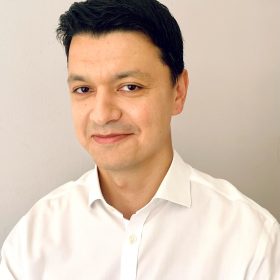
Parviz Rakhmonov:
Vice President, Quantitative Analyst, Citibank
Parviz Rakhmonov: Vice President, Quantitative Analyst, Citibank
Parviz Rakhmonov is a Quantitative Analyst at Citi, London since 2016. Prior to moving to quantitative finance, Parviz spent two years as a post-doctoral researcher at the Faculty of Mechanics and Mathematics in Lomonosov Moscow State University, focusing on research in Analytic Number Theory, teaching courses in Calculus and Number Theory. He holds a PhD and MSc in Mathematics from the Lomonosov Moscow State University.
17.30 – 18.15: QFC Panel
Large Language Models (LLM) in Quant Finance – A Gimmick or a Game Changer?
- Will LLMs help us read derivatives term sheets, UCITS documentation, and securitization rules
- Will LLMs help us document our models for the regulators
- Will LLMs help us find bugs in our pricing models
- GPT-4 or LLAMA 2?
ML Models for Valuation, XVA, and Risk
- How to build trustworthy ML quant models that auditors and regulators will approve
- Due to the lack of sufficient training data, is ML in quant models truly learning or only providing a better way to interpolate
Gala Dinner: TBC
08.00 – 09.00: Registration and Morning Welcome Coffee
09.00 – 09.15: Legends in Quantitative Finance: Riccardo Rebonato
Introduction: Andrei Lyashenko

Riccardo Rebonato:
Professor – Climate Impact Institute Scientific and Programme Director, EDHEC Business School
Riccardo Rebonato: Professor – Climate Impact Institute Scientific Director and Programme Director, EDHEC Business School
Riccardo Rebonato is Scientific Director of EDHEC-Risk Climate Impact Institute and Professor of Finance at EDHEC Business School. He heads EDHEC-Risk Climate Impact Institute’s “Impact of Climate Change on Asset Prices” research programme.
He holds doctorates in Nuclear Engineering and Condensed Matter Physics. Riccardo has been Head of Derivatives Trading, Risk Management and Research for leading international financial institutions on the sell- and buy-side, and served on the boards of ISDA and GARP. He was previously a Professorial Visiting Fellow at Edinburgh University (Political Economics and Sociology), Visiting Lecturer at Oxford University (Mathematical Finance), Adjunct Professor at Imperial College, London (Financial Economics) and a Research Fellow in Physics at Corpus Christi College, Oxford. Riccardo is currently Series Editor for the Cambridge Elements in Quantitative Finance.
He has published an extensive body of academic work, including more than 10 books and approximately 50 articles in refereed journals, in the areas of derivatives pricing, risk management, asset pricing and, latterly, the economics of climate change. His latest book deals with using economics to tackle climate change.
The Journal of Portfolio Management named him 2022’s “PMR Quant Researcher of the Year”.

Andrei Lyashenko:
Head of Market Risk and Pricing Models, Quantitative Risk Management (QRM), Inc.
Andrei Lyashenko: Head of Market Risk and Pricing Models, Quantitative Risk Management (QRM), Inc.
Andrei Lyashenko is the head of Market Risk and Pricing Models at the Quantitative Risk Management (QRM), Inc. in Chicago. His team is responsible for research, implementation and support of pricing and risk models across multiple asset classes. In November 2019, he was awarded the prestigious Quant of the Year award, jointly with Fabio Mercurio from Bloomberg, L.P., for their Risk Magazine paper on modeling backward-looking rates.
Andrei is also adjunct professor at the Illinois Institute of Technology. Before joining the QRM in 1997, Andrei was on the mathematical faculty at the University of Illinois at Chicago and Iowa State University. Prior to coming to the US, he conducted academic research in applied math in Russia, Japan and Italy and published numerous research papers in the area of fluid stability in major mathematical journals. He holds a BSc in Mathematics from the Novosibirsk State University, Russia and a PhD in Mathematics from the Russian Academy of Science.
Morning Stream Chair: TBC
09.15 – 10.45: Extended Session: On the use of Autoencoders in Risk-Neutral Yield Curve Modeling
(based on joint work by Andrei Lyashenko, Fabio Mercurio and Alexander Sokol)
Abstract:
It is well known that yield curves have low effective dimensionality and can be accurately represented using very few latent variables. The recent extension to nonlinear representations by means of autoencoders provided further improvement in accuracy compared to the classical linear representations such as PCA. In this presentation we discuss whether and how an autoencoder trained to historical yield curve data can be used in risk-neutral modeling of a yield curve. We propose an approach for building pricing term structure models consistent with an empirically estimated yield curve autoencoder.
Bullets:
- Yield curve autoencoders and static no-arbitrage condition
- Statically arbitrage-free yield curve bootstrapping
- The case of affine (linear) yield curve autoencoders
- Constructing autoencoder-consistent term structure models

Andrei Lyashenko:
Head of Market Risk and Pricing Models, Quantitative Risk Management (QRM), Inc.
Andrei Lyashenko: Head of Market Risk and Pricing Models, Quantitative Risk Management (QRM), Inc.
Andrei Lyashenko is the head of Market Risk and Pricing Models at the Quantitative Risk Management (QRM), Inc. in Chicago. His team is responsible for research, implementation and support of pricing and risk models across multiple asset classes. In November 2019, he was awarded the prestigious Quant of the Year award, jointly with Fabio Mercurio from Bloomberg, L.P., for their Risk Magazine paper on modeling backward-looking rates.
Andrei is also adjunct professor at the Illinois Institute of Technology. Before joining the QRM in 1997, Andrei was on the mathematical faculty at the University of Illinois at Chicago and Iowa State University. Prior to coming to the US, he conducted academic research in applied math in Russia, Japan and Italy and published numerous research papers in the area of fluid stability in major mathematical journals. He holds a BSc in Mathematics from the Novosibirsk State University, Russia and a PhD in Mathematics from the Russian Academy of Science.

Alexander Sokol:
Executive Chairman and Head of Quant Research, CompatibL
Alexander Sokol: Executive Chairman and Head of Quant Research, CompatibL
Alexander Sokol is the founder, Executive Chairman, and Head of Quant Research at CompatibL, a trading and risk technology company. He is also the co-founder of Numerix, where he served as CTO from 1996 to 2003, and the co-founder of Duality Group, where he served as CTO from 2017 to 2020.
Alexander won the Quant of the Year Award in 2018 together with Leif Andersen and Michael Pykhtin, for their joint work revealing the true scale of the settlement gap risk that remains even in the presence of initial margin. Alexander’s other notable research contributions include systemic wrong-way risk (with Michael Pykhtin, Risk Magazine), joint measure models, and the local price of risk (with John Hull and Alan White, Risk Magazine), and mean reversion skew (Risk Books, 2014).
Alexander earned his BA from the Moscow Institute of Physics and Technology at the age of 18, and a PhD from the L. D. Landau Institute for Theoretical Physics at the age of 22. He was the winner of the USSR Academy of Sciences Medal for Best Student Research of the Year in 1988.
10.45 – 11.15: Morning Break and Networking Opportunities
11.15 – 12.00: What is the impact of physical climate risk on equity valuation?
- Transition risk vs physical risk: which one is more important?
- Plausible ranges of equity revaluation.
- The importance of discounting.
- Are damages already in the prices?
- Headwind versus Minsky moment.

Riccardo Rebonato:
Professor – Climate Impact Institute Scientific and Programme Director, EDHEC Business School
Riccardo Rebonato: Professor – Climate Impact Institute Scientific Director and Programme Director, EDHEC Business School
Riccardo Rebonato is Scientific Director of EDHEC-Risk Climate Impact Institute and Professor of Finance at EDHEC Business School. He heads EDHEC-Risk Climate Impact Institute’s “Impact of Climate Change on Asset Prices” research programme.
He holds doctorates in Nuclear Engineering and Condensed Matter Physics. Riccardo has been Head of Derivatives Trading, Risk Management and Research for leading international financial institutions on the sell- and buy-side, and served on the boards of ISDA and GARP. He was previously a Professorial Visiting Fellow at Edinburgh University (Political Economics and Sociology), Visiting Lecturer at Oxford University (Mathematical Finance), Adjunct Professor at Imperial College, London (Financial Economics) and a Research Fellow in Physics at Corpus Christi College, Oxford. Riccardo is currently Series Editor for the Cambridge Elements in Quantitative Finance.
He has published an extensive body of academic work, including more than 10 books and approximately 50 articles in refereed journals, in the areas of derivatives pricing, risk management, asset pricing and, latterly, the economics of climate change. His latest book deals with using economics to tackle climate change.
The Journal of Portfolio Management named him 2022’s “PMR Quant Researcher of the Year”.
12.00 – 12.45: Guilt-free Cloud-based Production-grade Live Risk in Python
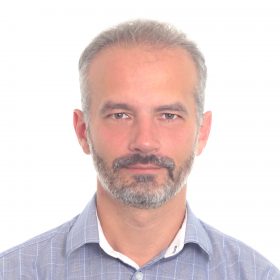
Dmitri Goloubentsev:
CTO, Head of Automatic Adjoint Differentiation, Matlogica
Dmitri Goloubentsev: CTO, Head of Automatic Adjoint Differentiation, Matlogica
Dmitri has 15 years of combined experience in model development working on C++ quant libraries. He worked as a Senior Quant Analyst in interest rate derivatives and played a leading role in delivering XVA solution at a major Canadian bank. Prior to focusing on AAD, he was responsible for construction of SIMM/MVA model. Dmitri earned his degree in Maths and Applied Maths from the Moscow State University.
12.45 – 14.00: Lunch
Afternoon Stream Chair: TBC
14.00 – 14.45: XVA Acceleration: the Nasdaq case study
- Strengths and pitfalls of Machine Learning for XVA
- A practical solution with Chebyshev Tensors: calibration and daily use
- The problem of dimensionality
- XVA sensitivities
- Case study: the Nasdaq XVA accelerator
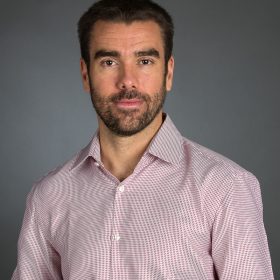
Ignacio Ruiz:
Ignacio Ruiz: Founder, MoCaX Intelligence
Ignacio Ruiz has been the Head of Counterparty Credit Risk Measurement and Analytics, Scotiabank, the head strategist for Counterparty Credit Risk, exposure measurement, for Credit Suisse, as well as the Head of Risk Methodology, equities, for BNP Paribas. In 2010, Ignacio set up iRuiz Consulting as an independent advisory business in this field. In 2014, Ignacio founded iRuiz Technologies to develop and commercialise MoCaX Intelligence.
Ignacio has several publications in the space of quantitative risk management and pricing. He has also published a comprehensive guide to the subject of XVA Desks and Risk Management.
He holds a PhD in nano-physics from Cambridge University.
14.45 – 15.30: Wrong-way risk and liquidity

Matthias Arnsdorf:
Global head of Counterparty Credit Risk Quantitative Research, J.P. Morgan
Matthias Arnsdorf: Global head of Counterparty Credit Risk Quantitative Research, J.P. Morgan
Since 2012 Matthias has been heading the counterparty credit risk quantitative research team globally.
His main responsibilities include the development & support of J.P. Morgan’s suite of credit exposure models which are used for valuation and risk management as well as credit capital.
Prior to his work in credit risk, Matthias headed the market risk capital modelling effort in EMEA for two years. Matthias started his career in finance in 2002 as a credit derivatives quantitative researcher at UBS and J.P.Morgan.
Matthias holds a PhD in Quantum Gravity from Imperial College London and has spent two years as a post-doctoral researcher at the Niels Bohr Institute in Copenhagen prior to his move to quantitative finance.
15.30 – 16.00: Afternoon Break and Networking Opportunities
16.00 – 16.45: Credit Exposure to Leveraged Counterparties
We present a model for calculating credit exposure to leveraged collateralized counterparties. The model is based on the observation that a large margin call can cause default of such a counterparty. The proposed model of leveraged wrong-way risk (WWR) can be easily implemented over the existing exposure simulation framework. We also show how to incorporate conventional WWR using a local Gaussian approximation. Finally, we extend the expected exposure scaling approach proposed in Andersen et al. (2017) for calculating expected exposure in the presence of initial margin to the case of leveraged WWR.
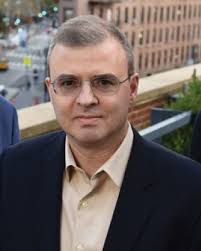
Michael Pykhtin:
Manager, Quantitative Risk, U.S. Federal Reserve Board
Michael Pykhtin: Manager, Quantitative Risk, U.S. Federal Reserve Board
Michael Pykhtin is a manager in the Quantitative Risk section at the U.S. Federal Reserve Board. Prior to joining the Board in 2009 as a senior economist, he had a successful nine-year career as a quantitative researcher at Bank of America and KeyCorp. Michael has edited “Counterparty Risk Management” (Risk Books, 2014) and “Counterparty Credit Risk Modelling” (Risk Books, 2005). He is also a contributing author to several recent edited collections. Michael has published extensively in the leading industry journals; he has been an Associate Editor of the Journal of Credit Risk since 2007. Michael is a two-time recipient of Risk Magazine’s Quant of the Year award (for 2014 and 2018). Michael holds a Ph.D. degree in Physics from the University of Pennsylvania and an M.S. degree in Physics and Applied Mathematics from Moscow Institute of Physics and Technology.
16.45 – 17.30: Overcoming Markowitz’s Instability with the Help of the Hierarchical Risk Parity (HRP)
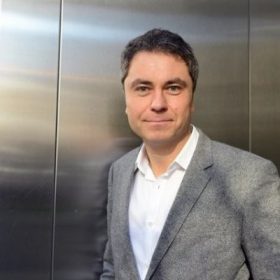
Alexandre Antonov:
Alexandre Antonov: Quantitative Research & Development Lead, Abu Dhabi Investment Authority (ADIA)
Alexandre Antonov received his PhD degree from the Landau Institute for Theoretical Physics in 1997. He worked for Numerix during 1998-2017, Danske Bank as the Chief Analyst in Copenhagen and is currently the Quantitative Research & Development Lead at Abu Dhabi Investment Authority (ADIA).
His activity is concentrated on modeling and numerical methods for interest rates, cross currency, hybrid, credit and CVA/FVA/MVA. AA is a published author for multiple publications in mathematical finance and a frequent speaker at financial conferences.
He has received a Quant of Year Award of Risk magazine in 2016.
17.30 – 18.15: QFC Panel
Large Language Models (LLM) in Quant Finance – A Gimmick or a Game Changer?
- Will LLMs help us read derivatives term sheets, UCITS documentation, and securitization rules
- Will LLMs help us document our models for the regulators
- Will LLMs help us find bugs in our pricing models
- GPT-4 or LLAMA 2?
ML Models for Valuation, XVA, and Risk
- How to build trustworthy ML quant models that auditors and regulators will approve
- Due to the lack of sufficient training data, is ML in quant models truly learning or only providing a better way to interpolate